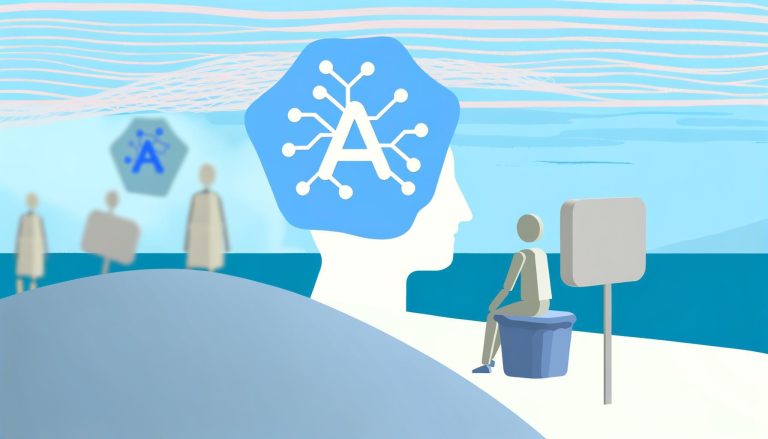Artificial Intelligence (AI) is revolutionizing many sectors, and mental health care is no exception. Understanding and treating complex conditions like depersonalization disorder (DPD) can be immensely challenging, but AI offers promising new ways to enhance our approach. In this article, we’ll explore how AI is helping professionals better understand and treat depersonalization disorder, providing valuable insights and practical tips along the way.
Introduction to Depersonalization Disorder
Depersonalization disorder, often abbreviated as DPD, is a dissociative condition characterized by a persistent or recurrent feeling of being detached from one’s body or mental processes, akin to being an observer of oneself. Individuals with DPD often describe their experiences as feeling like a robot or as though they are living in a dream.
The exact cause of DPD is not fully understood, but it is believed to be triggered by significant stress, trauma, or substance abuse. Its symptoms can be debilitating and interfere with daily life, necessitating effective treatment methods.
The Role of AI in Understanding Depersonalization Disorder
AI-Powered Diagnostic Tools
One of the key ways AI aids in understanding DPD is through advanced diagnostic tools. Traditional diagnosis often relies on self-reporting and clinician assessment, which can be subjective. AI, however, utilizes data-driven approaches to identify patterns and biomarkers that might indicate the presence of DPD.
- Machine Learning Algorithms: These algorithms analyze large datasets from clinical trials, patient histories, and other sources to pinpoint indicators of DPD. This can lead to more accurate and earlier diagnoses.
- Natural Language Processing (NLP): NLP tools analyze patient speech and written communication for signs of depersonalization. These tools can detect subtle nuances and inconsistencies that may elude human practitioners.
Improving Patient Monitoring
AI also plays a crucial role in monitoring patients with DPD. Continuous monitoring can provide real-time data and alert clinicians to changes in a patient’s condition.
- Wearable Technology: Wearable devices equipped with AI can track physiological signs like heart rate variability and sleep patterns, which may correlate with depersonalization episodes.
- Smartphone Applications: AI-powered mental health apps can prompt users to input their symptoms daily, providing a continuous stream of data that clinicians can analyze for trends and triggers.
AI in the Treatment of Depersonalization Disorder
Personalized Treatment Plans
One of AI’s most significant contributions to treating DPD is its ability to personalize treatment plans.
- Data Analytics: By analyzing data from various sources, AI can help formulate treatment plans tailored to the individual’s unique experiences and symptoms.
- Virtual Therapists: AI-driven virtual assistants can provide CBT (Cognitive Behavioral Therapy) exercises, mindfulness practices, and other therapeutic interventions at any time. These tools act as a supplement to traditional therapy, allowing for continuous support.
Enhancing Cognitive Behavioral Therapy (CBT)
CBT is a well-established treatment for DPD. AI can enhance the effectiveness of CBT by providing targeted exercises and feedback.
- Real-time Feedback: AI systems can analyze a patient’s responses during CBT sessions and provide immediate feedback, making therapy more interactive and effective.
- Virtual Reality (VR): AI-powered VR experiences can immerse patients in controlled, therapeutic environments, helping them confront and retrain their responses to triggers in a safe space.
Reducing the Burden on Mental Health Professionals
AI tools can handle various administrative tasks, leaving mental health professionals more time to focus on patient care.
- Automated Documentation: AI systems can automatically transcribe and summarize therapy sessions, reducing the load on clinicians.
- Scheduling and Follow-ups: AI-driven systems can manage appointments and remind patients of their follow-ups, ensuring they remain consistent with their treatment plans.
Benefits and Practical Tips for Using AI in DPD Treatment
Benefits
- Enhanced Accuracy: AI’s data-driven approach improves the accuracy of diagnoses and treatment plans.
- Personalized Care: Individualized treatment plans result in better patient outcomes.
- Cost-Effectiveness: AI tools can make mental health care more accessible and affordable.
- Continual Monitoring: Real-time data from wearable technology enables continuous patient monitoring.
Practical Tips
- Adopt AI Tools Gradually: Start with simple AI-driven applications and gradually integrate more complex systems to avoid overwhelming both patients and clinicians.
- Combine AI with Traditional Methods: Use AI as a supplement to traditional therapy rather than a replacement. Human empathy and expertise remain irreplaceable.
- Train Professionals: Ensure mental health professionals are adequately trained to use AI tools, providing them with the skills needed to get the most out of these technologies.
- Maintain Ethical Standards: Always prioritize patient privacy and ethical considerations when integrating AI into mental health care.
Conclusion
AI’s role in understanding and treating depersonalization disorder is both promising and transformative. By harnessing the power of AI, mental health professionals can achieve more accurate diagnoses, personalized treatment plans, and continuous patient monitoring, significantly enhancing patient outcomes. However, it is crucial to combine these advanced technologies with traditional methods and ensure that both patients and practitioners are well-prepared and ethically grounded in their use.
As we continue to explore the benefits of AI in mental health care, the potential to alleviate the challenges associated with depersonalization disorder becomes increasingly achievable. The Zenora App, with its mood and habit tracking, journaling capabilities, and goal-setting features, can be a valuable tool in this journey, providing users with consistent support and insights into their mental health.





